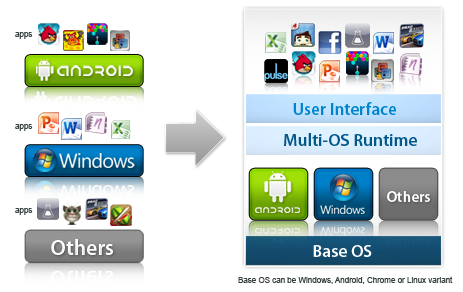BBC News released an article today that suggests that it will be possible to run Android apps on Windows 8. A company called BlueStacks has developed virtualization software that allows Android applications to run on top of Windows 8. AMD has created an application called AppZone player that uses BlueStacks’ virtualization code. The article explains that BlueStacks and AMD have entered into a deal that pre-loads AMD-based Windows 8 devices with this software, allowing these devices to run Android applications out of the box.
Virtualization software has existed for years as a way to leverage underutilized computing resources. It also allows for the installation and simultaneous use of different operating systems on the same hardware. On my home server running Windows Server 2008 R2 (soon to be Windows 2012 Datacenter), for example, I run an instance of Ubuntu Server via Microsoft’s Hyper-V hypervisor software. Another example is the Java programming language. Java programs run in a virtual machine, the JVM, that sits on top of the host operating system. BlueStacks has taken advantage of virtualization technology to allow Android applications to run on top of Windows 8 in much the same way. The BlueStacks App Player is available on Windows and Mac, currently allowing Android apps to run in these environments. According to their website, they have plans to expand their software to allow Windows applications to run on Android, and to allow Android applications to run on Chrome OS. It will be interesting to see how fast virtualized Windows applications run on an Android mobile device. Perhaps newer mobile processors are fast enough to allow this, but I’m fairly sure my old HTC EVO would have a difficult time running virtualized Windows applications.
I have been trying to decide which platform to write my next mobile app for, and the decision has been between Android and Windows 8. I already have Java programming experience and I own an Android phone, so I was originally going to make an Android app. I then thought it would be fun to learn how to write a Windows 8 app. It would give me a reason to spend more time learning .NET and take advantage of my free DreamSpark Premium download of Windows 8 and Visual Studio 2012 Ultimate. This is precisely why Microsoft gives away its software to students, and I don’t feel too bad about playing into their hand; I am, after all, a technophile! Perhaps the increasing popularity of virtualization will make my decision obsolete in the very near future.

